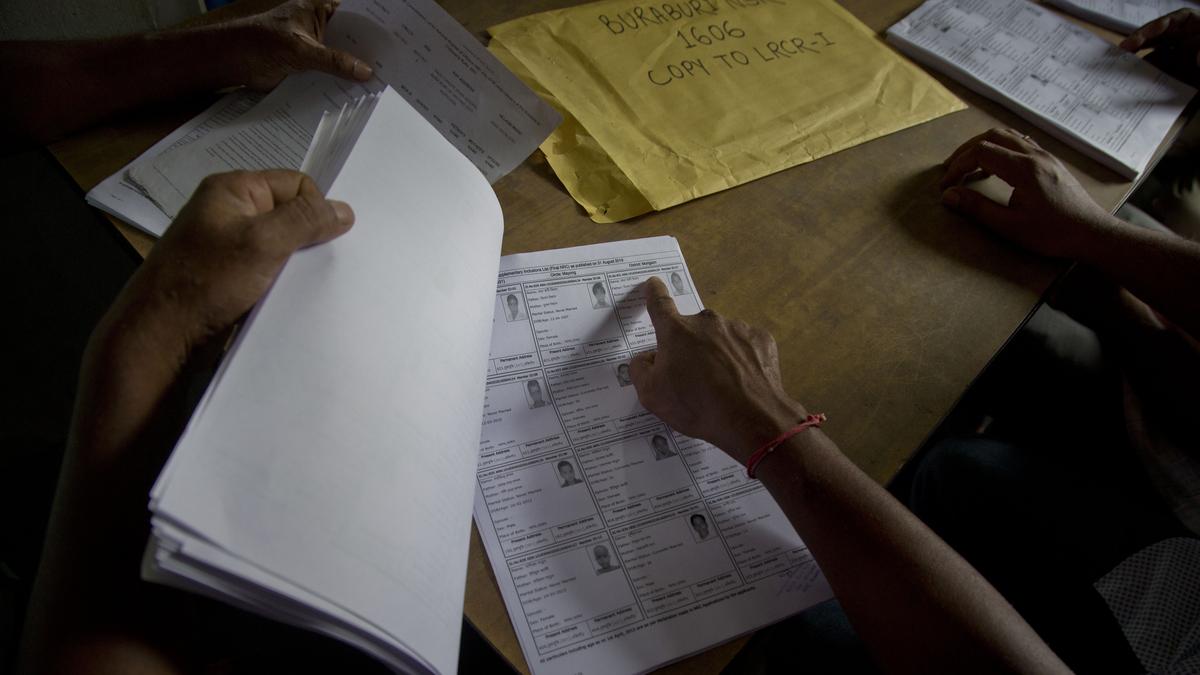
‘The SIR also has features of the ordeal the people of Assam experienced during the National Register of Citizens exercise’
| Photo Credit: AP
We are now in the second week since the sudden launch of the ongoing Special Intensive Revision (SIR) of electoral rolls in Bihar, on June 24, 2025. By now we all know that this SIR is happening after a gap of over 20 years. But this is only a half truth. The SIR now is fundamentally different from all the earlier SIRs. The ongoing SIR entails a complete reconstruction of the electoral rolls based on the submission of documents by aspiring and applicant electors.
Revisiting trauma
Its suddenness and utter lack of transparency have rekindled memories of the traumatic experience of demonetisation in 2016. It is no wonder that the people of Bihar have begun calling the SIR as ‘votebandi’ after the popular Hindi term ‘notebandi’ to denote demonetisation. But the SIR also has features of the ordeal the people of Assam experienced during the National Register of Citizens exercise. An estimated 50 million voters of Bihar are being subject to a harsh ‘eligibility test’ in order to prove their citizenship and voting right.
The NRC in Assam was, however, not a sudden campaign, and was under the watch of the Supreme Court of India. It took six years and two rounds to cover an applicant population of 33 million, and even now the Assam government is not ready to accept the NRC that emerged, with close to two million rejections/exclusions. In Bihar, filled-in enumeration forms and accompanying enabling documents are to be collected from all, in just a month’s time. And the month in question is July when the monsoon is vigorous, and when large parts of north Bihar are likely to be flooded and seasonal migration is at its peak. While the sheer scale and circumstances of this sudden operation make it clear that it is going to be a logistical nightmare, what makes it an insurmountable hurdle race for large numbers of Bihar electors is the list of 11 enabling documents that the Election Commission of India (ECI) wants as proof of electoral eligibility. Documents commonly available with the people such as the Aadhaar card, voter card, ration card, job card or even the driving licence are not acceptable to the ECI. Instead, the documents it demands — birth certificate, matriculation degree, land or house ownership record, caste certificate, passport — are rarely available with the common man in Bihar. How on earth are they going to prove their eligibility or citizenship?
What makes matters inordinately more difficult is the high out-migration from Bihar. Almost every family has a member who is studying or working outside the State. During the COVID-19 pandemic, the lockdown in 2020 saw the shocking spectacle of migrant Biharis trekking back home over thousands of kilometres. Now many of these migrant Biharis are liable to be removed from the revised rolls on the spurious grounds that they no longer ‘ordinarily reside’ in Bihar.
The cruel reality that forces millions to seek a livelihood outside Bihar now renders them ‘outsiders’ for purposes of the electoral roll. Even as the slums built by migrant Bihari workers are being bulldozed in Delhi, the electoral rolls being prepared in Bihar threaten to evict them in their own State. The spectre of mass disenfranchisement is now an undeniable reality. The ECI recently gave us an electoral roll in Maharashtra exceeding the adult population of the State. Unable to explain this statistical scam, has the ECI now chosen Bihar for a ‘balancing act’ where millions are liable to be removed from the electoral roll for no fault of theirs?
A fundamental disruption
According to the ECI’s declaration, the Bihar SIR template will be replicated across the country in the months ahead. What we are witnessing is a fundamental disruption of the electoral democracy that has been practised in India since the adoption of the Constitution and enactment of the Representation of the People Act 1951. Amid the chaos that has been triggered by the ‘votebandi’ drive in Bihar, are at least three warning signals for India’s beleaguered democracy.
The onus of proving citizenship is being shifted from the state to the citizen. The empowered elector has become a doubtful voter and the onus to clear this doubt and pass the eligibility test lies on the suspect and document-deficient voter. This is akin to a reversal of the fundamental principle of natural justice that one is innocent till proven guilty. This is a huge disaster in the making.
A disenfranchised category
The ECI tells us that being a citizen is a constitutional prerequisite for becoming an eligible elector, and all that the SIR is doing is a verification of that eligibility. Electors on the 2003 roll are being presumed to be India’s citizens, and, hence, rightfully eligible voters; all the others will have to prove it. Even if we accept that those eliminated from the electoral roll will still be considered ‘citizens’, we are now looking at a permanent category of disenfranchised citizens. In other words, India will have millions of second grade and absolutely insecure citizens who will, henceforth, be at the mercy of the state or the majority of empowered first-grade citizens. The implications are alarming and clear.
Universal adult franchise has been the cornerstone of India’s Constitution and electoral framework. In many countries, vast sections of ‘excluded’ and ‘disempowered’ people, on grounds of race, ethnicity, class and gender, had to fight for decades in order to secure equal electoral rights.
In India we won it at one go with the attainment of freedom and the adoption of the Constitution. Now, in Bihar, with the insistence on submitting educational certificates and ownership records, are we now looking at a new order of restricted or selective franchise?
Dipankar Bhattacharya is General Secretary of the Communist Party of India (Marxist-Leninist) Liberation
Published – July 09, 2025 12:08 am IST
